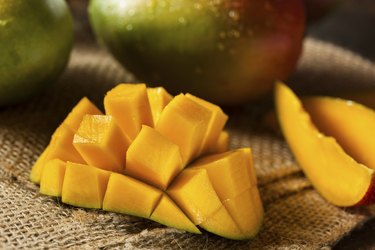
Your body is better able to use some forms of vitamin E than others. While vitamin E occurs in eight natural chemical forms, only one form called alpha-tocopherol meets human requirements. That's why dietary intake recommendations for vitamin E are solely based on alpha-tocopherol. Alpha-tocopherol comes in more than one form, including d-alpha and dl-alpha tocopherol acetate. The vitamin E content of dietary supplements and foods is listed on labels in international units.
D-alpha-tocopherol
Video of the Day
Supplements that are made from entirely natural sources contain d-alpha-tocopherol. This also is referred to as RRR-alpha-tocopherol. D-alpha-tocopherol is the most bioavailable form of alpha-tocopherol, meaning it's the type that is preferred for use by your body and is better absorbed and utilized than other forms. To calculate the amount of this form that is bioavailable, use the following formula: number of international units times .67 equals the milligrams that are bioavailabe. For example, 100 international units times .67 equals 67 milligrams.
Video of the Day
Dl-Alpha-Tocopherol
Dl-alpha-tocopherol is a synthetic form of alpha-tocopherol. This synthetic form of alpha-tocopherol is less bioavailable than the d-alpha-tocopherol and is only half as potent, notes the Oregon State University Linus Pauling Institute. This form of alpha-tocopherol is frequently found in nutritional supplements and fortified foods. To calculate the amount of this form that is bioavailable, use the following formula: number of international units times .45 equals the milligrams that are bioavailabe. For example, 100 international units times .45 equals 45 milligrams.
Acetate
When you see the word acetate at the end, it means your alpha-tocopherol supplement is in ester form. Esters are more resistant to oxidation than unesterfied tocopherols, extending the supplement's shelf life. The bioavailability of this form of vitamin is equal to the free alpha-tocopherol form.
Considerations
Use d-alpha tocopherol if you are supplementing when pregnant because it is transferred from you to your baby three times better than the synthetic dl-alpha tocopherol, recommends "The Vitamin E Factor," by Andreas M. Papas. However, discuss supplementation with your doctor first. Also consult your doctor on the proper dosage during pregnancy.
The recommended dietary allowance for vitamin E, or alpha-tocopherol, is 15 milligrams, or 22.4 international units. Vitamin E supplements, in general, contain 100 international units to 1,000 international units of alpha-tocopherol. Vitamin E is contained in many foods including sunflowers, peanuts, spinach, tomatoes, mangoes and soybean oil.